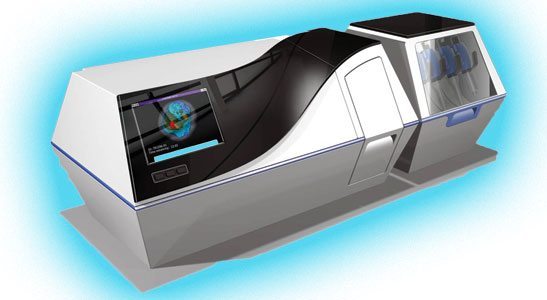In September 2010, the City of Phoenix, in partnership with VisionGate, opened the world’s first biomedical 3D cellular imaging lab.
The Cell-CT research lab is located on the Phoenix Biomedical Campus in downtown Phoenix.
A year later, VisionGate is well on its way to developing a revolutionary non-invasive test for the early detection of lung cancer. This summer, company representatives presented groundbreaking data at the International Association for the Study of Lung Cancer’s 14th World Conference on Lung Cancer in Amsterdam, Netherlands.
The data showed how adjunctive use of its LuCED™ test can improve the utility of low dose X-ray computed tomography (CT) screening for the early detection of lung cancer in high-risk individuals. LuCED uses VisionGate’s revolutionary automated 3D cell imaging platform, the Cell-CT™, which generates high-resolution 3D biosignatures from intact cells using a sputum sample.
Dr. Claudia Henschke, a lung cancer researcher at the Biodesign Institute at Arizona State University who is also a practicing physician at Mount Sinai Medical Center in New York City, serves as a leader of the International Early Lung Cancer Action Program. She is co-author of a pioneering study of the benefits of CT scans for lung cancer.
“Today, almost all patients diagnosed with lung cancer in the U.S. die. The NLST study results released last November confirmed our initial findings showing that CT scans can find lung cancers in their earliest stage, when up to 92 percent can be cured,” Henschke said.
The proposed first use of LuCED as an adjunct to CT screening reflects the results of the National Cancer Institute’s (NCI) landmark National Lung Screening Trial (NLST) of more than 53,000 current and former heavy smokers, which showed that low-dose helical CT screening reduced lung cancer deaths by 20 percent, compared with standard chest X-rays. These dramatic results were first presented last November and were expanded in an online edition of the New England Journal of Medicine.
“The dramatic results of the NLST study provide us with a valuable initial indication for our LuCED test,” said Scarlett Spring, president of VisionGate. “By combining the high accuracy and cost effectiveness of our non-invasive LuCED diagnostic with the proven ability of CT screening to reduce lung cancer deaths, we hope to make mass screening feasible and affordable.”
For more information about VisionGate and its 3D imaging visit www.2011worldlungcancer.org or www.visiongate3D.com.
Arizona Business Magazine September/October 2011




